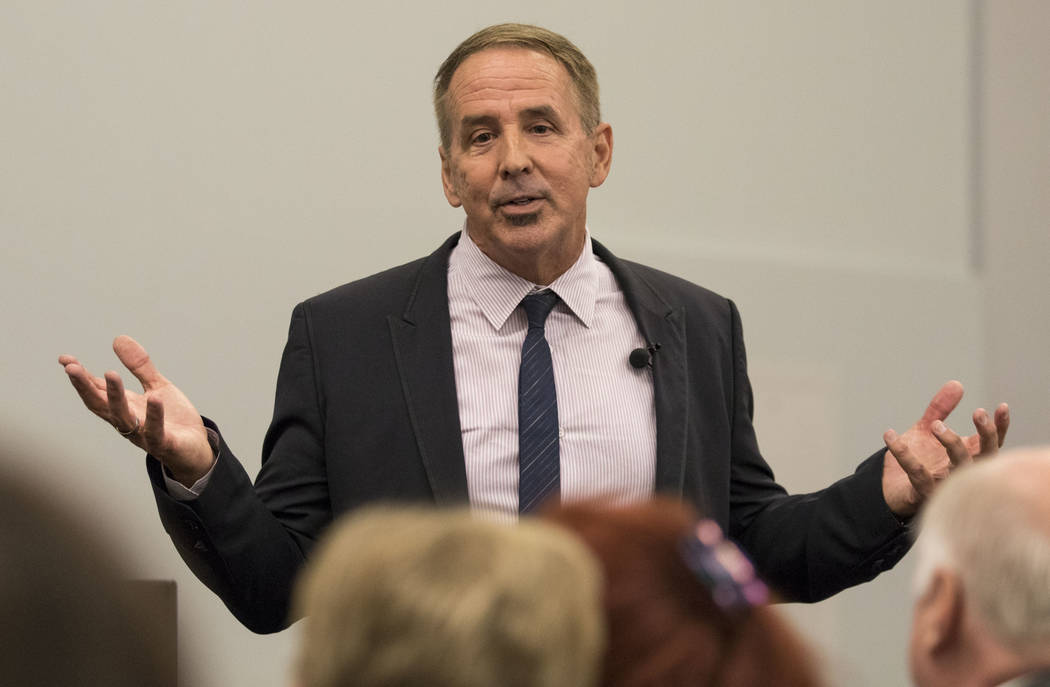Role of new UNLV COO unclear despite announcement of new position

It’s been three days since Thom Reilly announced the creation of a chief operating officer position for UNLV, and little is known about who will hold the job and what that person will do.
The new management role, which comes amid public controversy about UNLV President Len Jessup’s job performance, is part of the “appropriate action” the Nevada System of Higher Education chancellor intends to take in the months leading up to Jessup’s public evaluation. Reilly cited operational deficiencies within UNLV as the catalyst for his decision.
But several key questions remain about the new role, including the salary, job description and its permanence.
“We’re in discussions about the scope of it,” Reilly said. “We’re still working on that.”
Reilly said Thursday that he envisions this position reporting to Jessup. A source familiar with the situation said UNLV has money in reserves to pay for the position, and that there will be open lines of communication between the person hired and the chancellor’s office.
Useful talent
Stephen Joel Trachtenberg, co-author of “Presidencies Derailed: Why University Leaders Fail and How to Prevent It” and the former president at George Washington University and the University of Hartford, said how the COO position is defined will determine if the addition is good for Jessup.
“If Reilly is going to pick the COO, then that makes it very difficult for Jessup,” Trachtenberg said. “If the chief operating officer has total budget control, then who he or she reports to, and to what extent the chief operating officer can be hired and fired, and by whom, becomes paramount. If the person is reporting to the chancellor, he has put in a subordinate president.”
The way the situation has played out in public might muddy the waters, too.
“If Jessup is unhappy with the way the chancellor has made this public, it’s harder for Jessup to do it,” Trachtenberg said. “He’s obliged to be a little embarrassed and defensive. It’s a little messy, reading about it in the newspaper. But it’s possible he could suck it up and turn it around.”
Reilly announced the position Tuesday following reports that Jessup was being forced out of the university with about two years remaining on his five-year contract.
Jessup last week told the campus community the reports were “misleading,” but he acknowledged he is looking for other opportunities amid tensions with some members of the Nevada Board of Regents.
He did not comment for this story.
“This is an additional resource for the president and UNLV,” Reilly said Thursday. “I view this as helpful to the president — helpful to UNLV.”
Trachtenberg said a chief operating officer role is not a “radical idea.”
“The chief operating officer of some sort, under some title, exists almost everywhere,” he said. “A president has so many distractions that at some point in the administration, there’s going to be a colleague who handles different functions, and they may be called any one of a variety of titles.”
Some colleges that employ a chief operating officer include the the University of Florida, Chapman University, Georgetown University and the University of Louisville.
Trachtenberg said when he was a university president he surrounded himself with professionals who complemented his skills. He always brought on two assistants — one good with words and one good with numbers.
“Rare people have the ability to dance and sing at the same time,” he said. “I think the ball is in Jessup’s court. If he can find a way to use this opportunity to his advantage — if he hires someone with the right skillset and loyalty, to the president, not the chancellor, he could actually pick up some useful talent.”
Lines of authority
Scott Jaschik, editor of Inside Higher Ed, said a similar situation played out at the University of Massachusetts Boston last year.
Barry Mills, a former Bowdoin College president, stepped into a newly created position of deputy chancellor and chief operating officer at UMass Boston, which eroded power from the university’s chancellor, J. Keith Motley, according to Inside Higher Ed.
A report published by Inside Higher Ed in March 2017 said the hiring set up “an unusual leadership situation at UMass Boston.” The university was struggling with financial difficulties and faculty unease even as it carried out wide-ranging construction projects.
With the addition of the new position at UNLV, Jaschik said it’s important for the university to establish clear lines of authority.
“The position, and the context, are important,” he said. “Is he trying to watch what the president does until the president leaves? Does the person report to the president or the chancellor?”
Contact Natalie Bruzda at nbruzda@reviewjournal.com or 702-477-3897. Follow @NatalieBruzda on Twitter.













